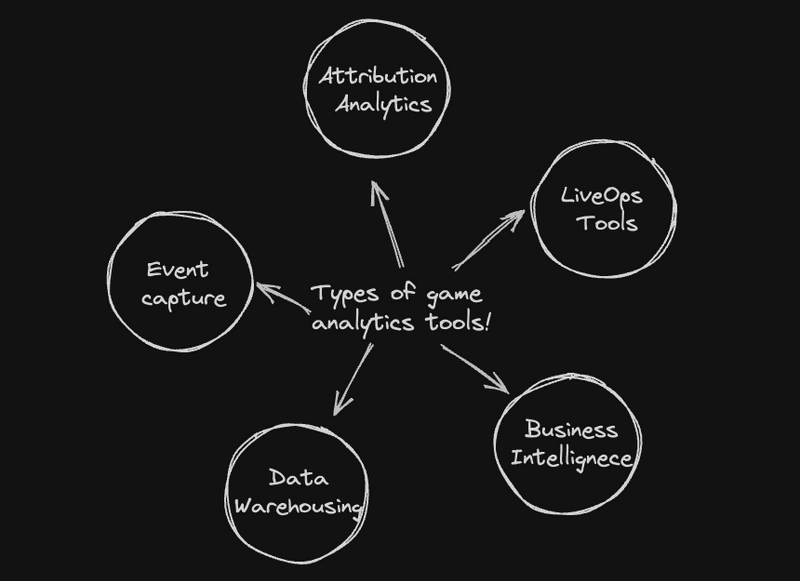Importance of Game Analytics for the Growth of Mobile Games

Introduction
Game analytics has emerged as a significant influencer in the gaming industry's growth mechanism. In the fast-evolving landscape of mobile gaming, developers and publishers are constantly challenged to differentiate themselves in a crowded market. Here’s where game analytics has been playing a pivotal role in guiding gaming companies toward creating more engaging, profitable, and user-friendly games. Through this article, we unfold the role of game analysis in facilitating growth and its various associated aspects.
What is Game Analytics?
In short - game analytics is essentially the process of collecting, analyzing, and interpreting data generated from player interactions within a game. Game analytics is like a magnifying glass for gaming product managers and developers which gives clarity in player behavior patterns, preferences, and dislikes in a game.
This data encompasses a wide range of metrics, from acquisition sources to basic user retention to revenue to complex behavioral patterns. By leveraging this information, gaming companies can make informed decisions that enhance player experiences, optimize game design, retain users, and ultimately, increase revenue.
Uses and Importance of Game Analytics
Game analytics serves multiple purposes in the mobile gaming industry, primarily focusing on improving player retention, increasing monetization, and enhancing overall game quality. Here’s how it makes a significant impact:
Enhanced Player Experience:
Analytics help identify what players enjoy most about a game and what frustrates them. This information is crucial for PMs and developers to fine-tune gameplay, fix bugs, and introduce new content that meets players' expectations.
Targeted Marketing and Personalization:
By understanding player demographics and behaviors, gaming studios and publishers can tailor their marketing and acquisition efforts to specific segments, thus optimizing their return on ad spend (ROAS)
Monetization Strategy Optimization:
Game analytics becomes the backbone of effective monetization strategies. It allows PMs and developers to determine their game's most lucrative aspects, such as in-app purchases and ad placements, to maximize revenue streams without detracting from the user experience.
Predictive Analytics:
Leveraging game analysis, developers can anticipate the future actions of the players. This helps in planning updates or new content based on what players are likely to enjoy, ensuring that resources are invested in the most impactful areas for improved user retention rates.
Game Customization:
Game analysis aids in customizing the gaming experience based on the player's style of play. By tracking the choices of the players in the game, using LiveOps, product managers can adjust the story or challenges accordingly, making it more engaging.
Feedback and Review Analysis:
Analyzing player feedback and reviews form a crucial part of game analysis. This feedback aids in understanding the game's shortcomings and areas that need enhancement.
The strategic use of game analytics not only amplifies a game's financial success but also ensures its longevity and relevance in a highly competitive market.
Types of Game Analytics Tools

To harness the full potential of game analytics, several specialized tools and platforms are utilized, each serving distinct functions. Let’s take a look at some of the key categories:
Attribution Analytics
Attribution analytics tools track the origin of users who downloaded a game. This type of analytics is vital for understanding the effectiveness of marketing campaigns by measuring the customer acquisition cost (CAC), return on ad spends (ROAS), and user quality from different sources basis their day one retention(D1 retention). By identifying which advertisements or partnerships lead to the most game downloads, companies can optimize their marketing spend to focus on the most productive channels.
Event Capture Tools
Event capture tools are at the heart of game analytics, recording predefined actions that players take within the game, such as reaching a new level, making a purchase, or interacting with other players. This real-time data is crucial for understanding how players interact with the game and which elements are engaging enough which makes them spend more time on the app.
Data Warehousing
Data warehousing is the storage and management of vast amounts of data collected from various sources including event capture tools and attribution tools. A robust data warehouse tool or software allows game developers to integrate different data streams in one place. This provides them with a comprehensive view of a game’s performance and user interactions across multiple platforms and devices.
Business Intelligence and Dashboarding
If you have a data warehouse in place you’re going to need a business intelligence (BI) tool to visualize and analyze your mothership of data from a game’s entire lifecycle to get actionable insights. These tools often come with dashboard capabilities, presenting complex data in a visual format that is easy to understand and act upon. BI tools will help product managers and game producers understand player trends, track KPIs, and forecast future game performance.
LiveOps Tools
Live operations (LiveOps) tools enable developers to manage games post-launch by providing them the means to update content, manage in-game events, and engage with players without needing to deploy new versions of the game for every small change made. These tools are essential for maintaining an active and engaged user base, and essential for a game’s long-term success. LiveOps tools will allow you to play around with the game mechanics based on player patterns and actions. With LiveOps tools, gaming PMs can keep players engaged with new content, stories, experiences, reward, and more, as they progress through the game.
Conclusion
The importance of game analytics in the growth of mobile games cannot be overstated. As the gaming landscape continues to evolve, leveraging game analytics will be key to staying ahead of the curve and delivering exceptional gaming experiences. Whether it’s improving player experience, optimizing monetization strategies, or enhancing marketing efforts, game analytics provides the insights necessary to make informed decisions.
So choose your game analytics tools wisely, because they will pave the way for growth for your game!

Comments
Your comment has been submitted